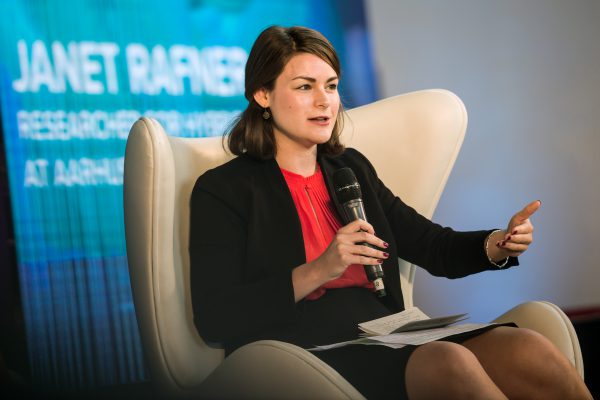Employee Spotlight – Janet Rafner
It is time to put our Director of Learning, Janet Rafner, in the spotlight. Her exciting work is highly interdisciplinary and involves studying creativity! This blog also features an interesting and shocking trend with gender biases in the development of AI products! We highlight this, as we celebrate International Women’s Day on March 8th.
How did you start to work here and when?
In 2015 I received a Fulbright Fellowship to come to Denmark from the United States and study how complex phenomena are conveyed visually. I started out working with another faculty member at Aarhus Institute for Advanced Studies, but after hearing about the work at ScienceAtHome, I also joined the group part-time. I ended up moving to Copenhagen for a couple of years to pursue a Master’s Degree at the Niels Bohr Institute but worked closely with ScienceAtHome on my thesis which centered around the Turbulence Game. After that, I moved back to Aarhus and have been full-time with ScienceAtHome ever since.
What is your role at ScienceAtHome?
I am finishing an interdisciplinary Ph.D. at the intersection of hybrid intelligence, citizen science, and creativity. As part of this, I lead international consortiums in all three domains which involve not only research but lots of coordination between external researchers and our own team. This is hard work, but it is also really rewarding to deeply understand how our ScienceAtHome research agenda fits into other work going on around the world. As part of the creativity work, I am leading the creation of a large-scale game-based creativity portfolio called CREA. I am also involved in developing a scientific argumentation tool called ArguNotes.
In addition to this, I am the Director of Learning at ScienceAtHome where as one of my jobs I am in charge of our Exploration Group which brings parts of the team together once a week for talks and presentations and now during corona, the occasional zoom beer :) I have been with the group for five and half years, making me one of the ‘oldest’ members so I also do my best to welcome new teammates and answer any questions they might have :)
What are you passionate about in relation to your work?
All of it. There are so many exciting ideas to explore at the intersection of hybrid intelligence, citizen science, and creativity. But if I had to choose, it would be how the work at ScienceAtHome beautifully bridges between academia and ‘the real world.’ I have spent a lot of time studying the field of Science, Technology, and Society, as well as science communication and I really love how ScienceAtHome works to produce high-quality research with real-world impact and communicates it well to the general public.
What is your best work-related memory?
I really love how much I am (or rather was) able to travel around the world to present our work and engage in discussions with many different researchers and practitioners. While now I can’t physically travel for meetings due to covid-19, I am still able to attend events online and talk to people who have never heard about our work before. Seeing their excitement and exploring possible ways to collaborate is so much fun. In particular, in November 2019 I traveled to Qatar for the World Innovation Summit in Education (WISE) and had an incredible experience discussing our work in creativity and hybrid intelligence and its potentials for the educational sector.

Janet Rafner at Future Port Prague in 2019
What is your favorite thing about working here?
The combination of really kind, talented compassionate teammates and really interesting work is why I have been with ScienceAtHome for so long. Especially now during the Covid-19 lockdown, I am so thankful for my great colleagues, helping to keep our spirits up and supporting each other during difficult and stressful times.
March 8 is International Women’s day
What is important for you to focus on for International Women’s day?
For me, it is important to focus on gender bias in Artificial intelligence (AI). AI is becoming increasingly prevalent in our lives from recommending which shows we watch on Netflix to helping build airbag systems in cars and developing medicine. These systems need to be developed by diverse teams and with diverse data sets to ensure that the technology is effective and fair for everyone. Take this concrete example from Forbes magazine:
“seatbelts, headrests, and airbags in cars which have been designed mainly based on data collected from car crash dummy tests using the physique of men and their seating position. Women’s breasts and pregnant bodies don't feed into the “standard” measurements. As a result, women are 47% more likely to be seriously injured and 17% more likely to die than a man in a similar accident” - Forbes Article
I highly recommend checking out the rest of the article for a more in-depth discussion of gender bias in AI!
Lastly, on International Women’s day it is important for me to reflect on some of the best advice I have ever received: have a mentor and be a mentor. The female mentors in my life have helped shape who I am today. I am so grateful to them and hope that I can also be there to support other women in the field.
Extremely relevant focus and words from Janet Rafner. Do you want to play an AI-powered game that explores creativity and helps to increase participation in working towards reaching the Sustainable Development Goals (SDGs)? Try crea.blender SDG and create powerful, thought-provoking visions of utopias and dystopias.
